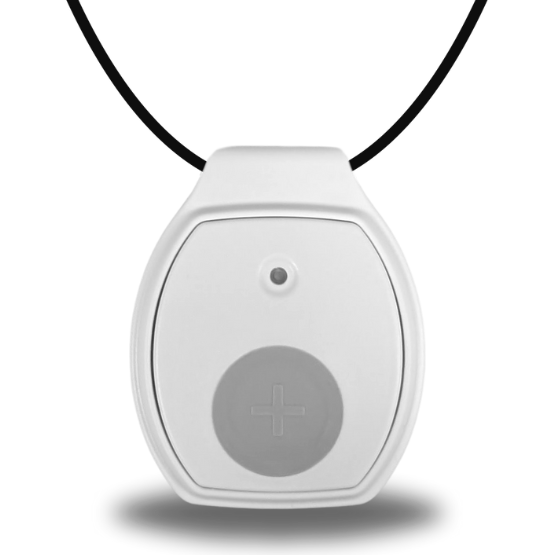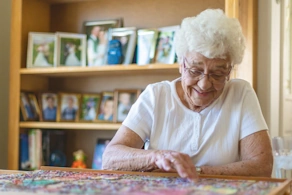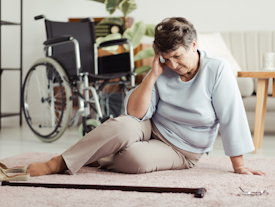Can Dehydration Cause Dizziness? Understanding The Connection For Seniors
For Canadian seniors, even minor changes in hydration can have a big impact on health. Seasonal shifts in Canada—especially cold, dry winters and hot, humid summers—can make it harder to stay properly hydrated. One of the most common and overlooked symptoms of dehydration is dizziness—a sensation that can increase fall risk and disrupt daily routines.
Knowing this connection is key to protecting your well-being or caring for an older loved one. Explore how dehydration affects balance, why seniors are more vulnerable, and what steps can be taken to stay safely hydrated. By recognizing the signs early, Canadian seniors can take action to avoid dizziness and stay steady on their feet.
Life Assure Product Quiz
Find The Perfect Medical Alert Device
Take our 30 second quiz and discover which Life Assure medical alert device is the right fit for you or a loved one.
Life Assure Product Quiz
Find The Perfect Medical Alert Device
Take our 30 second quiz and discover which Life Assure medical alert device is the right fit for you or a loved one.
What Is Dehydration?
Dehydration occurs when the body loses more fluids than it takes in, leaving it without enough water to function properly. For seniors, this can happen more easily due to age-related changes like reduced thirst sensitivity and lower total body water content. Certain medications, chronic conditions, or warmer environments can also contribute.
Without adequate hydration, key systems in the body—like circulation, temperature regulation, and muscle function—start to suffer. Even mild dehydration can lead to fatigue, confusion, and dizziness. Staying hydrated is especially important for older adults who want to maintain their energy, focus, and physical stability throughout the day.
Dehydration doesn't always stem from a lack of drinking water. Illnesses that cause fever, diarrhea, or vomiting can accelerate fluid loss. Diuretic medications or diets high in caffeine or alcohol can also pull water from the body more quickly than it's replaced. In colder weather, dehydration may be less noticeable but just as harmful since drier air and layered clothing can lead to fluid loss without the usual thirst cues.
Understanding how and when the body loses fluids helps seniors and caregivers be more proactive about hydration—making it part of a daily wellness routine rather than just a response to thirst.
The Link Between Dehydration And Dizziness
Can dehydration cause dizziness? Yes—and it's one of the more common and concerning symptoms, especially for older adults. When you're dehydrated, your blood volume drops, leading to a decrease in blood pressure. This can reduce the flow of oxygen to your brain, resulting in lightheadedness or dizziness, particularly when standing up too quickly.
For seniors, dizziness caused by dehydration increases the risk of falls, confusion, and difficulty performing daily activities. Even a mild fluid imbalance can disrupt balance and coordination. Recognizing this connection helps seniors and caregivers take quick action to restore hydration and prevent potentially serious complications.
Risk Factors For Dehydration In Seniors
Older adults are more vulnerable to dehydration for several reasons. As we age, the body's ability to conserve water declines and the sensation of thirst becomes less reliable. Many seniors also take medications—such as diuretics or laxatives—that increase fluid loss.
Chronic health conditions like diabetes or kidney disease can raise the risk of dehydration, especially when combined with limited mobility or cognitive changes that make it harder to monitor fluid intake. Hot weather, illness, and reduced appetite can further contribute. Understanding these risk factors is key to preventing complications like dizziness, fatigue, and confusion, making hydration a daily priority for seniors and their caregivers.
Common Signs Of Dehydration In Seniors
Recognizing the early signs of dehydration helps prevent more serious symptoms like dizziness or fainting. For seniors, dehydration may not always present with extreme thirst. Instead, look for dry mouth, dark-colored urine, reduced urination, fatigue, or headaches. Muscle cramps, lightheadedness, and confusion are also common indicators.
In more advanced cases, seniors might experience low blood pressure, rapid heartbeat, or dizziness when standing. These symptoms can significantly increase the risk of falls and injury. Caregivers should stay alert for subtle behavioral changes, such as irritability or disorientation, which could signal dehydration. Prompt intervention can help restore fluid balance and prevent complications.
How To Prevent Dehydration And Dizziness
Preventing dehydration starts with consistent, daily hydration habits. Seniors should aim to drink small amounts of water regularly throughout the day, even if they don't feel thirsty. Incorporating hydrating foods, like cucumbers, watermelon, or soups, can also boost fluid intake.
Simple daily strategies include:
- Keep a water bottle nearby: A visible, easy-to-grip bottle serves as a helpful reminder to sip regularly.
- Monitor urine color: Pale yellow is typically a sign of good hydration; darker shades may indicate the need for more fluids.
- Eat water-rich foods: Fresh fruits, vegetables, broths, and smoothies contribute to daily fluid goals in a flavorful way.
- Set hydration reminders: Timers or phone alerts can prompt regular drinking, which is especially helpful for those with memory challenges.
- Limit dehydrating beverages: Reduce intake of alcohol and caffeine, particularly in warm weather or when active outdoors.
For seniors with mobility issues, caregivers can assist by offering fluids during meals or medication times. These simple routines help maintain fluid balance, support circulation, and reduce the risk of dizziness or fainting throughout the day.
When To Seek Medical Help
While mild dehydration can often be managed at home, dizziness related to fluid loss should never be ignored—especially for seniors. If you experience dizziness that doesn't improve after rehydration, it may signal a more serious issue. Seek medical attention if dizziness is accompanied by confusion, rapid heartbeat, low blood pressure, fainting, or an inability to retain fluids.
Chronic dehydration may also indicate an underlying health concern or medication side effect. Seniors with ongoing dizziness should speak with a healthcare professional to determine the cause and develop a safe hydration plan. Caregivers need to monitor seniors who may have cognitive impairments or mobility challenges that make self-care more difficult. Early intervention can prevent complications and support long-term well-being.
Conclusion
Dizziness can disrupt daily life, especially for seniors who are already managing mobility or health challenges. Often, the cause is as simple and preventable as not drinking enough fluids. By staying mindful of hydration and recognizing early signs of fluid loss, older adults can reduce the risk of balance issues and feel more confident in their daily routines.
Make water a part of your daily wellness plan, enjoy hydrating foods, and talk to your healthcare provider if symptoms persist. A consistent hydration habit is one of the most effective ways to maintain energy, stability, and independence at any age.











 Get Help With The Push Of A Button
Get Help With The Push Of A Button















